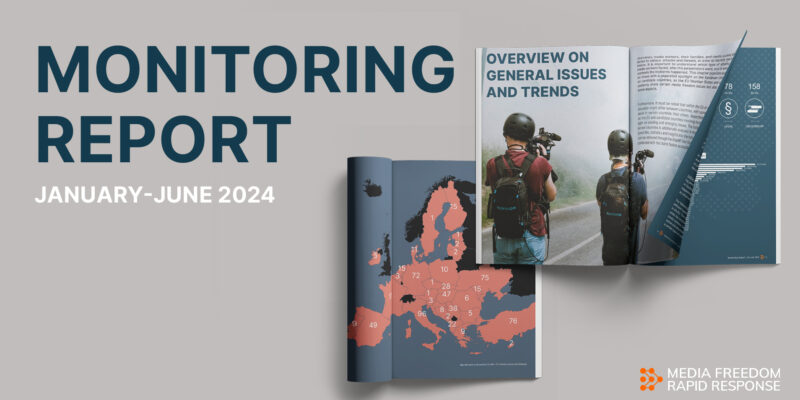
The state of media freedom in Croatia is concerning, given that out of the seven cases of media freedom violations recorded so far this year, five were committed by members of the government or other officials. Prime Minister Andrej Plenković himself has discredited journalists in public discussions due to their critical reporting about him and his party, among other things, as stated in the latest report from the Media Freedom Rapid Response (MFRR), which conducted research in EU member states and candidate countries from January to June 2024 in partnership with others.
Partners in the Media Freedom Rapid Response consortium today released their latest report on their monitoring, which documents and analyzes all media freedom violations recorded on the Mapping Media Freedom platform in European member states and candidate countries from January to June 2024. The report was prepared by the European Center for Press Freedom (ECPMF), the European Federation of Journalists (EFJ), and the International Press Institute (IPI).
In the first six months of 2024, 12 alerts were recorded involving 15 individuals or entities related to media.
“The state of media freedom in Croatia has become particularly concerning, as of the seven monitored verbal attacks, five were committed by members of the government or public officials. Prime Minister Andrej Plenković has discredited journalists in public discussions due to their critical reporting about him and his party,” the report states, adding that the weekly Nacional published a recording in April of an internal meeting of the Croatian Democratic Union (HDZ) in which Prime Minister Plenković accused news outlets like N1, Telegram, and Nacional of being part of a conspiracy against him and the party.
Furthermore, it is noted that after Jutarnji List uncovered confidential correspondence via WhatsApp between the then-judge, now Chief State Prosecutor Ivan Turudić, and former State Secretary Josipa Rimac regarding their frequent meetings and mutual affection, Plenković accused Jutarnji List of corruption and malicious reporting.
It is also mentioned that discrediting comments from politicians are not new; the example of Prime Minister Plenković is reiterated, who verbally insulted a reporter from N1 television at a press conference to avoid answering her questions.
Another significant concern is expressed regarding attacks on the media coming from the far-right Homeland Movement.
“In June of this year, Homeland Movement politician Stjepan Nikola Bartulica accused journalist Andrej Dimitrijević of ‘media harassment’ and ‘intimidation’ due to alleged unauthorized photographing of his car, in which his children could be seen, as part of an investigation into properties Bartulica had not declared in his asset declaration. The leader of the Homeland Movement, Ivan Penava, on the other hand, stated in May that his party would support a new coalition government led by conservative HDZ Prime Minister Andrej Plenković only if it ceased funding the weekly Novosti. Penava expressed deep disagreement with the editorial policy of Novosti, which is known for its critical writing about the government. After this incident, Novosti received threatening messages,” the report states.
The reporting period also recorded three online threats. In March, the portals Faktograf and Klimatski portal were subjected to a large smear campaign initiated by Mario Nakić, the founder of the portal Liberal.hr, who claimed in an article published on his portal that Klimatski portal is financed by Prime Minister Andrej Plenković and urged readers to punish the ruling coalition in the parliamentary elections for this reason. Nakić also discredited the portal with similar comments on his X account.
The report recalls SMS bomb threats in May directed at the editorial office of Nacional, whose owner Ivo Pukanić and his close associate Niko Franjić were killed in a car bomb attack in Zagreb in October 2008.
“Recent amendments (hereinafter ‘Lex AP’) to the Criminal Code further undermine media freedom, including Article 307.a, which introduced a prison sentence of up to three years for disclosing ‘non-public’ information about investigative measures or evidence in criminal proceedings. Although the controversial article does not directly concern journalists, it endangers whistleblowers. At the same time, it opens the possibility for the police or prosecutors to investigate and pressure the disclosure of confidential journalistic sources, which may include the seizure of journalistic equipment. The changes to the Criminal Code have come at a critical moment for journalists who are under constant judicial pressure. Ongoing threats and attacks on media professionals from politicians and public officials increase the risk for journalists who are already facing challenging circumstances in a difficult environment for media freedom in Croatia. In response to the documented challenges to media freedoms, with journalists often in danger, the MFRR has scheduled an international fact-finding mission to Croatia in September 2024,” the MFRR report states, whose mission in Croatia is currently underway.
On the platform that maps the state of media freedom, 756 violations of media freedoms affecting 1,212 individuals or entities related to the media were recorded in just the first half of the year. Of these, 474 were recorded in EU member states, while 282 occurred in candidate countries.
In addition to providing an overview of media freedom violations in EU member states and candidate countries, the report includes three thematic chapters addressing laws against the media, the manipulation of media images and the integrity of journalists, and elections. The report also provides a detailed insight into the state of media freedom, according to data from Mapping Media Freedom, in the following countries: Albania, Croatia, France, Georgia, Germany, Hungary, Italy, Serbia, Slovakia, and Ukraine.
You can download the full report here.